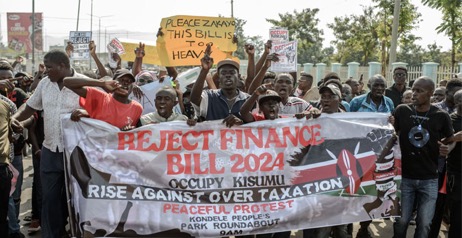
Current Tax Landscape in The Gambia
The recent announcement of tax increases by the Gambian government has sparked intense discussions and debates across various sectors. While the need for revenue generation is evident, the approach to tax policy and resource mobilization requires careful consideration. President Barrow's emphasis on domestic resource mobilization is a step in the right direction, but it must be accompanied by strategic long-term planning and prudent fiscal management.
According to data from the Gambia Revenue Authority (GRA), tax revenue as a percentage of GDP has been fluctuating over the past decade, ranging from 12% to 16%. This indicates a level of volatility and uncertainty in revenue collection, highlighting the importance of stable and sustainable tax policies.
Critical Situational Assessment
According to Dr Ousman Gajigo, a Gambian economist formerly of the African Development Bank (AfDB) and non-resident fellow at the Africa Policy Research Institute (APRI), the recent decision to increase taxes by the government highlights a short-term approach lacking a clear vision for long-term development and comprehensive tax reforms.
While there are valid justifications for tax increases – such as influencing consumer behaviour or creating a more progressive tax system – increasing the tax rate is arguably a myopic approach that has significant limitations in generating sustainable revenue growth, and can impede future domestic revenue mobilization efforts.
Tax revenues hinge on the tax rate, tax base, and collection efficiency. The current tax policy woefully ignores the essential need to expand the tax base and improve collection efficiency. The flaw in corporate income tax assessment, particularly the higher of net income or gross revenue, presents challenges for businesses, especially those incurring initial losses.
Furthermore, the allocation of the 2024 budget heavily favours recurrent expenditures over critical sectors like infrastructure and agriculture, indicating poor planning and inadequate prioritization.
The disparity between expenditure profiles and long-term development needs further exasperates the underlying issues thus amplifying fiscal strain, leading to short-term measures like tax hikes.
Urgency of Structural Tax Reforms
Addressing structural tax reforms, revising tax laws to incentivize capital-intensive businesses, and establishing a fair and sustainable tax regime is critical for fostering economic growth and ensuring fiscal stability.
The Gambia's tax base remains limited thus hindering revenue mobilization efforts. The current tax code's shortcomings, particularly in corporate income tax assessment, pose challenges for businesses, especially those incurring initial losses. Dr Gajigo emphasizes the importance of revising tax laws to incentivize capital-intensive businesses and ensure a fair and sustainable tax regime.
The mismatch between expenditure profiles and long-term development needs creates fiscal pressure, leading to short-term revenue generation measures like tax increases. However, without addressing structural tax reforms and budget prioritization, this cycle perpetuates budget deficits and hampers sustainable economic growth.
Similarities with Kenya's Tax Challenges
Kenya, despite its more diversified and larger economy compared to The Gambia, has faced similar tax challenges. Both countries have resorted to tax hikes to address budget deficits, albeit with varying degrees of success. Kenya's experiences with tax policy reforms, revenue collection, and economic diversification offer valuable insights for The Gambia.
A comparative analysis of tax revenue data between Kenya and The Gambia reveals interesting trends. While Kenya's tax-to-GDP ratio has shown gradual improvement, ranging from 15% to 19% over the past decade, The Gambia's ratio has been relatively stagnant, hovering around 14% to 16%. This disparity underscores the need for strategic reforms to enhance revenue generation in The Gambia.
Key Differences
Despite similarities in tax challenges, Kenya and The Gambia differ significantly in economic scale, diversification, and tax policy frameworks. Kenya's larger and more diversified economy provides a broader tax base and resilience to economic shocks, whereas The Gambia's economy remains vulnerable due to its reliance on agriculture and tourism.
Data from the World Bank and other international organizations highlight Kenya's progress in tax collection efficiency and economic diversification. Kenya's Ease of Doing Business Index rank has improved over the years, signalling a conducive business environment that supports revenue generation and private sector growth. In contrast, The Gambia faces challenges in tax administration, collection efficiency, and regulatory frameworks that hinder economic diversification and revenue mobilization.
Considerations for the Gambian Government
- Comprehensive Tax Reforms: The Gambian government should prioritize comprehensive tax reforms that modernize the tax code, enhance collection efficiency, and broaden the tax base. According to the World Bank's Doing Business Report, The Gambia ranks lower than Kenya in ease of paying taxes, indicating room for improvement in tax administration and compliance processes.
- Strategic Budget Allocation: Misallocation of budgetary funds towards recurrent expenditures can stifle economic growth and lead to persistent deficits. The Gambian government must focus on the strategic allocation of funds towards development projects in infrastructure, agriculture, and other growth-driving sectors. Kenya's budget allocation trends can serve as a benchmark for effective fiscal management.
- Transparent Justifications for Tax Increases: Lack of credible and transparent justifications for tax hikes can erode public trust and lead to social unrest. The Gambian government should clearly articulate the rationale behind tax increases and ensure that additional revenue is directed towards impactful development projects. Kenya's experiences highlight the importance of maintaining public trust through transparency and accountability.
- Economic Diversification: Over-reliance on a narrow economic base increases vulnerability to external shocks. The Gambia should aim to diversify its economy beyond agriculture and tourism. Learning from Kenya's efforts to develop sectors like technology and manufacturing can provide valuable insights for economic resilience.
- Enhancing Tax Collection Efficiency: Inefficient tax collection systems can lead to revenue leakage and undermine fiscal stability. The Gambian government should invest in improving tax collection infrastructure and administrative capabilities. Kenya's efforts to enhance collection efficiency through technology and better enforcement mechanisms offer practical lessons. While the Gambia government has made strides in this area through the recent appointment of SIPA, a Swiss company, to assist the Gambia Revenue Authority (GRA) with modernizing tax administration, the choice of SICPA has raised ethical concerns due to the Company's history of corruption and bribery allegations. SICPA has faced fines for bribery and illegal activities in several countries, including Colombia, Venezuela, Brazil, and Brazil, allegedly totalling over $240 million. The company's corruption allegations involve money laundering, embezzlement, and bribing officials at high levels, including its CEO and majority shareholder.
Economic Fragility and Risk of Public Backlash
The recent events in Kenya surrounding tax hikes offer crucial insights into public reactions and potential consequences in The Gambia. Kenyan lawmakers faced intense backlash and protests against proposed tax increases, leading to adjustments and revisions in tax policies. The impact on people's cost of living, especially concerning essentials like food and transportation, cannot be overlooked.
Data from consumer price indices and household expenditure surveys can provide a deeper understanding of how tax increases affect the cost of living and household budgets. Kenya's experience with VAT exemption removal on basic goods and services, higher taxes on mobile money transfers, and new levies on motor vehicles offers a case study for assessing the potential repercussions of similar measures in The Gambia.
Public opinion polls, focus group discussions, and stakeholder consultations are essential to elucidate the sentiments and concerns of citizens regarding tax policies and their economic implications. Engaging with civil society organizations, professional associations, and business groups is essential for gathering diverse perspectives and fostering inclusive policymaking processes.
Conclusion
The Gambia can learn valuable lessons from Kenya's experiences in navigating tax challenges for sustainable development. Strategic tax reforms, transparent governance, prudent fiscal management, and economic diversification are key pillars for achieving long-term fiscal stability and economic resilience. By leveraging data, statistics, and insights from Kenya and other comparable economies, The Gambia can chart a path towards robust revenue generation, reduced dependency on external support, and inclusive growth.
Otherwise, we risk igniting the powder keg of public discontent and protest amid a fragile economy currently marred by the rising cost of living, stagnating wages, high unemployment particularly amongst the youth, and conspicuous rapidly growing wealth inequality in The Gambia.
About the Author: Tedla E. Khan is an economic analyst and regular contributor to the national discourse on finance, fiscal policy, and sustainable development. Tedla is the Founder and Managing Partner of Azeb Capital, an Africa-focused boutique management consulting firm based in The Gambia.
Read Other Articles In Opinion





